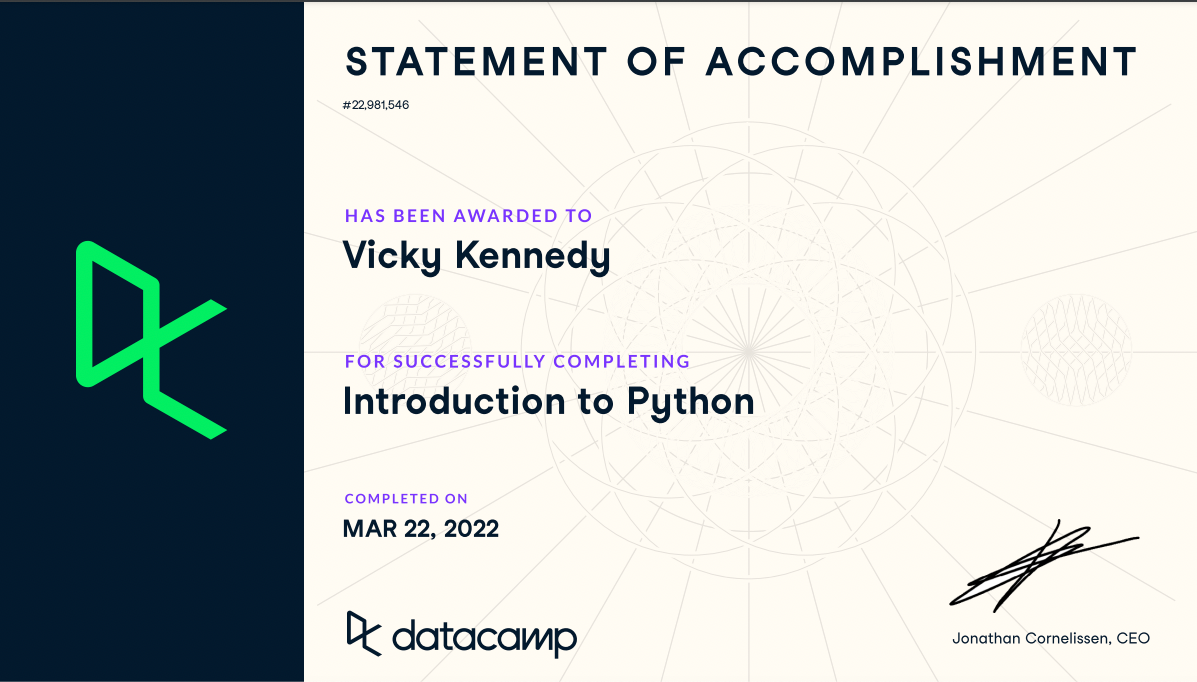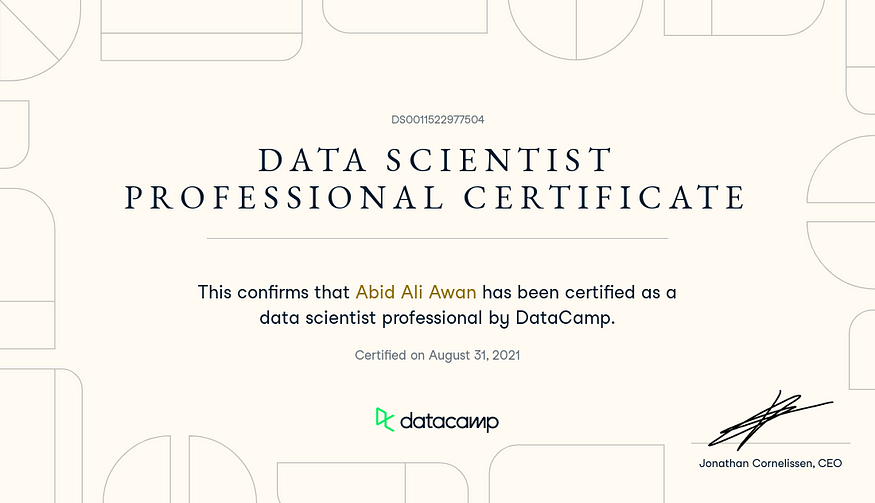Track
With the current AI boom, professionals and newcomers to the industry alike are considering AI certification to give them an advantage in the job market. But are such certifications necessary? And what are the best AI certifications out there at the moment? As well as exploring some of the options available to you, we’ve also highlighted some useful resources for helping you learn AI from scratch.
Earn a Top AI Certification
TL;DR - The Top AI Certifications for 2026
If you're looking for a top-level look at the artificial intelligence certification market in 2026, check out our summary below. If you're in a hurry to get started, be sure to check out our AI Fundamentals skill track.
Top AI Certifications in 2026:
- AI Fundamentals Certification – DataCamp. For beginners and professionals seeking foundational AI knowledge.
- AI Engineer for Data Scientists Associate – DataCamp. For data scientists transitioning into AI engineering; includes timed and practical exams.
- Certified Artificial Intelligence Scientist (CAIS) – USAII.Designed for senior leaders looking to develop AI strategy skills.
- Artificial Intelligence Certification – ARTIBA. Technical certification for CS/IT professionals pursuing AI careers.
- Azure AI Engineer Associate – Microsoft. For developers building and deploying AI solutions using Azure tools.
- Jetson AI Courses & Certifications – NVIDIA Developer. Hands-on, project-based learning in AI and Edge AI using Jetson hardware.
- Artificial Intelligence Graduate Certificate – Stanford University. Rigorous academic program with credit eligibility toward a master’s degree.
- Professional Certificate in Machine Learning & AI – MIT Professional Education. In-depth, customizable learning experience for experienced professionals.
Why Choose AI Certification?
The field of artificial intelligence is not just growing; it is exploding. The AI market size, currently valued at over $240bn, is expected to reach $738.80bn by 2030. This staggering growth translates into a soaring demand for AI-skilled professionals. Whether you are a beginner in the data science field or an experienced practitioner, AI certifications can significantly bolster your career, equipping you with the skills and knowledge to stay ahead in a highly competitive market.
Exploring The Best AI Certifications For 2026
Now that we know the benefits of getting AI certified, let’s look at some of the options you have available. These cover a range of skill levels, career pathways, and costs, but all have their pros and cons.
1. AI Fundamentals Certification | DataCamp
- Target audience: Professionals looking to validate foundational knowledge of AI, including business leaders, aspiring AI practitioners, and teams in need of a comprehensive understanding of AI basics.
- Key skills covered: Core AI concepts, machine learning fundamentals, generative AI, and ethical considerations for AI implementation.
- Career pathways: Supports career growth by establishing a foundational understanding of AI, aiding in decision-making and ethical assessment for projects involving AI.
- Experience needed: No programming experience required; suitable for all knowledge levels.
- Cost: $25 per month (included with Premium Membership), flexible timeline
2. AI Engineer for Data Scientists Associate Certification | DataCamp
- Target audience: Aspiring AI Engineers with a background in data science looking to validate core skills for pre-entry-level roles in AI development and deployment.
- Key skills covered: Data management, exploratory analysis, AI governance, application development, MLOps, and foundational AI programming in Python.
- Career pathways: Helps data professionals transition into AI engineering by certifying essential knowledge in building and managing AI systems. Builds credibility for roles in AI development, model deployment, and production systems.
- Experience needed: Suitable for learners with a data science foundation. Python experience is required, but no prior AI engineering role experience is necessary.
- Cost: $25 per month (included in DataCamp Premium Membership); certification must be completed within 30 days of registration.
3. Certified Artificial Intelligence Scientist | CAIS
- Target audience: Senior AI professionals, including managers, directors, and CXOs, with limited technical knowledge.
- Key skills covered: Strategic AI, AI workflow, securing applications, AI for business and finance.
- Career pathways: Enhances AI strategy and solution development skills for business transformation.
- Experience needed: No mandatory programming skills required.
- Cost: $1,195, self-paced, 4-25 weeks with 8-10 hours of learning per week
4. Artificial Intelligence Certification | ARTIBA
- Target audience: Professionals with degrees in Computer Science/IT or related fields, with variable work experience requirements.
- Key skills covered: AI and ML systems and applications, data modeling, NLP, machine learning, computer vision, human-computer interactions.
- Career pathways: AI engineer and technology roles with a focus on diverse applications and solutions.
- Experience needed: Depends on educational background; programming knowledge essential for Bachelor's and Master's degree holders.
- Cost: $550, inclusive of exam and learning resources
5. Microsoft Certified: Azure AI Engineer Associate - Certifications
- Target audience: Professionals tasked with building, managing, and deploying AI solutions using Azure AI, covering all phases of AI solution development.
- Key skills covered: Planning and managing Azure AI solutions, implementing decision support, computer vision, natural language processing, knowledge mining, document intelligence, and generative AI solutions.
- Career pathways: Azure AI Engineers with responsibilities across requirements, development, deployment, integration, maintenance, performance tuning, and monitoring of AI solutions.
- Experience needed: Proficiency in Python and C#, with knowledge of Azure AI portfolio, data storage options, and responsible AI principles.
- Cost: $165
6. Jetson AI Courses and Certifications | NVIDIA Developer
- Target audience: Suitable for anyone interested in AI and Edge AI, from beginners to advanced learners.
- Key skills covered: Developing AI projects using NVIDIA Jetson with a focus on machine learning or deep learning and GPU acceleration.
- Career pathways: Offers opportunities to engage in AI-related projects and innovations.
- Experience needed: Basic familiarity with Python and Linux and the ability to create AI-driven open-source projects.
- Cost: Free, although the cost of the Jetson developer kit starts at $149.
7. Artificial Intelligence Graduate Certificate | Stanford School of Engineering
- Target audience: Graduate-level professionals seeking advanced, academically rigorous AI training with potential credit toward a master’s degree.
- Key skills covered: Machine learning, deep learning, NLP, computer vision, robotics, reinforcement learning, and probabilistic modeling.
- Career pathways: Prepares learners for advanced technical roles, AI-focused research, or leadership in AI-driven organizations.
- Experience needed: Strong math and programming background required; Bachelor’s degree with 3.0+ GPA.
- Cost: $19,682–$24,224 total; 100% online with flexible pacing over 1–3 years.
8. Professional Certificate in Machine Learning & AI | MIT Professional Education
- Target audience: Technical professionals and managers with 3+ years of experience in fields like computer science, engineering, or statistics who want hands-on AI expertise.
- Key skills covered: Machine learning, deep learning, NLP, reinforcement learning, AI strategy, ethics, and deployment across domains like healthcare, robotics, and design.
- Career pathways: Equips professionals to lead or support AI initiatives, apply cutting-edge methods in industry, and drive digital transformation.
- Experience needed: Bachelor's degree in a technical field and relevant work experience; programming and analytical background recommended.
- Cost: Varies by course ($2,500–$4,700 each) + $325 application fee; complete 16+ days of courses within 36 months.
Top AI Certifications Compared
In the table below, we've compared the key features of each of the AI certifications we've covered:
| Certification | Target Audience | Key Skills Covered | Career Pathways | Experience Needed | Cost |
|---|---|---|---|---|---|
| AI Fundamentals Certification (DataCamp) | Business leaders, aspiring AI practitioners, teams | Core AI, ML fundamentals, generative AI, AI ethics | Foundational AI literacy for project decisions and team alignment | None; beginner-friendly | $25/month (with Premium), flexible timeline |
| AI Engineer for Data Scientists Associate (DataCamp) |
Data scientists pursuing AI engineering roles | Data management, exploratory analysis, governance, MLOps, Python | Entry-level AI engineering, model deployment, production systems | Data science foundation; Python required | $25/month (with Premium); complete in 30 days |
| Certified Artificial Intelligence Scientist (CAIS) | Senior professionals (managers, directors, CXOs) | Strategic AI, workflows, securing AI, business/finance use | Strategy and transformation leadership in AI | No programming required | $1,195, self-paced (4–25 weeks) |
| Artificial Intelligence Certification (ARTIBA) | CS/IT degree holders with varied experience | ML systems, NLP, CV, HCI, data modeling | AI engineer and tech specialist roles | Programming required for Bachelor’s/Master’s holders | $550 (includes exam + resources) |
| Microsoft Certified: Azure AI Engineer Associate | Developers working with Azure AI platforms | AI solution planning, NLP, CV, decision support, generative AI | Azure AI solution development and maintenance | Proficiency in Python, C#, Azure tools | $165 |
| Jetson AI Certifications (NVIDIA Developer) | Beginners to advanced learners in Edge AI | AI with NVIDIA Jetson, GPU-accelerated ML/DL projects | Project-based innovation in Edge AI | Basic Python, Linux familiarity | Free (Jetson kit starts at $149) |
| Artificial Intelligence Graduate Certificate (Stanford) | Graduate-level professionals seeking academic depth | ML, DL, NLP, robotics, RL, probabilistic models | Advanced technical roles, research, leadership | Strong math, programming; Bachelor’s with 3.0+ GPA | $19,682–$24,224; 1–3 years online |
| Professional Certificate in ML & AI (MIT) | Experienced professionals in tech, data, or engineering | ML, DL, NLP, RL, AI deployment, ethics | AI leadership, domain-specific applications | Bachelor’s in technical field; relevant experience | $2,500–$4,700/course + $325 fee; 16+ days over 36 months |
AI Certification vs Certificate
The first thing to consider is the difference between AI certificates and certification. Although often used interchangeably, there are some significant differences between the two.
AI certifications are typically awarded by professional bodies or educational institutions and involve a rigorous assessment process. To obtain certification, candidates are usually required to pass an exam or a series of exams that test their knowledge and skills in specific areas of AI.

An example of a DataCamp Python certificate - different from a certification
On the other hand, AI certificates are usually educational achievements signifying the completion of a course or series of courses in a specific area.

An example of DataCamp’s Python certification
Both are useful and can demonstrate your experience and skills. Choosing between the two depends on your career goals, current skill level, and the time and resources you can dedicate to your education. If you're seeking to solidify your expertise and gain a competitive edge in the job market, an AI Certification might be the right choice. However, if you're looking to expand your knowledge or explore a new area within AI, an AI Certificate could be a more suitable and flexible option.
Step-by-Step Guide to Choosing the Right AI Certification
Now that you have an idea of some of the options available to you, it’s time to think about which one is the right fit for you. Here’s what you need to consider when choosing an AI certification:
Identifying your career goals and skill level
The process starts with a clear understanding of your career aspirations and current expertise. Reflect on your professional goals, whether it's advancing into a leadership role, specializing in a niche AI field, or shifting towards a data science career. Equally important is assessing your existing skill set in AI and related domains. This self-assessment helps in selecting a certification that matches your career trajectory while complementing your current level of knowledge and experience.
Analyzing course content and industry recognition
When selecting an AI certification, scrutinize the course content to ensure it aligns with both your career objectives and the latest industry trends. A well-rounded curriculum that balances theoretical knowledge with practical applications is ideal. Additionally, consider the certification's recognition within the industry. Opt for programs that are respected by professionals and organizations in the AI field, as these are more likely to enhance your employability and open up better career opportunities.
Considerations for time commitment and financial investment
The practical aspects of pursuing an AI certification, such as time and financial investment, are crucial factors in your decision. Evaluate the time commitment required and consider your ability to balance it with professional and personal responsibilities. Financially, consider both the immediate cost and the potential long-term benefits. While some certifications might be expensive, their value in advancing your career could justify the investment. Explore options for financial aid or employer-sponsored programs to alleviate cost concerns.
Preparing for AI Certification with DataCamp
Embarking on an AI certification requires a combination of foundational knowledge, strategic study techniques, and leveraging the right resources. DataCamp offers a comprehensive suite of courses to help you prepare effectively.
Prerequisites and foundational knowledge required
AI certifications generally demand a solid foundation in mathematics and statistics, which is crucial for understanding AI concepts, especially in areas like machine learning and deep learning. Basic mathematical concepts such as linear algebra, calculus, and probability are essential, as these are often applied in AI algorithms.
Similarly, a fundamental understanding of statistics is vital for interpreting data and deriving insights essential to AI applications. Equally important is a proactive mindset and an eagerness to learn, given the rapidly evolving nature of the field.
DataCamp offers courses that can help build these foundational skills. For mathematics, the Demystifying Mathematical Concepts for Deep Learning tutorial and Linear Algebra for Data Science in R course cover essential concepts. In statistics, the Statistics Fundamentals with Python Skill Track provides a solid grounding in statistical principles and their application in Python.
Study tips and resources for effective learning
If you’re working towards an AI certification, with DataCamp's courses and resources, you can systematically prepare for your exams, ensuring a well-rounded grasp of both the theoretical and practical aspects of AI.
- Develop programming skills: Proficiency in programming languages such as Python and R is crucial for implementing AI concepts. DataCamp's Python Programming Skill Track and R Programming Skill Track are excellent resources to build and hone these skills.
- Master data manipulation: Data manipulation skills are fundamental in AI, as they enable you to prepare and transform data for analysis. Courses like Data Manipulation with Python and Data Manipulation with R skill tracks on provide practical experience in these areas.
- Understand data science fundamentals: A strong grasp of data science concepts is vital for AI. DataCamp offers Data Scientist with Python and Data Scientist with R career tracks, which comprehensively cover the necessary skills in data science.
- Learn machine learning: As AI heavily relies on machine learning, understanding its fundamentals is key. Our Machine Learning Fundamentals with Python Skill Track and similar courses in R provide a solid foundation in machine learning concepts and techniques.
- Practice regularly: Apply what you learn in real-world scenarios and projects to reinforce your knowledge and skills. Check out our list of AI projects to help you on your way.
- Stay updated: AI is a fast-evolving field. Regularly follow AI-related news, blogs, and participate in forums to stay abreast of the latest developments.
Our machine learning cheat sheet can help as a quick reference as you revise
Final Thoughts
AI certifications have become more than just educational accolades; they are gateways to thriving careers in a rapidly expanding field. Whether you're a seasoned professional or a newcomer, understanding the nuances between AI certifications and certificates and selecting the right one is crucial.
The AI market, poised for exponential growth, opens up myriad opportunities for those equipped with the right skills and knowledge. Through careful consideration of your career objectives, skill level, course content, industry recognition, and practical commitments, you can find a certification that aligns perfectly with your professional aspirations.
DataCamp's diverse range of courses and resources offers a solid foundation for your journey toward AI certification, empowering you with the necessary tools to excel in this dynamic domain. With AI shaping the future, now is the time to embrace these opportunities and propel your career to new heights. Get started with our AI Fundamentals certification track today. If you already have a base knowledge, consider the AI Engineer for Data Scientists Associate Certification.
Earn a Top AI Certification
FAQs
Are AI certifications worth it?
AI certifications can indeed be worth it if you're looking to validate your skills, gain a competitive edge in the job market, and keep pace with the rapid advancements in the field of artificial intelligence. They provide formal recognition of your expertise and can open up new career opportunities in a variety of industries increasingly reliant on AI technologies. AI skills are in incredibly high demand, and employers sought concrete evidence of candidates' expertise to de-risk the hiring process.
How much do AI certifications cost?
Costs vary widely, from free courses (like NVIDIA's Jetson AI Courses, which are technically free) to more expensive options (like the CAIS at $894). Consider how each certification matches your goals before investing both finances and time.
What key skills are covered in AI certifications?
AI certifications cover a range of skills, including AI and ML systems, data modeling, NLP, machine learning, computer vision, planning and managing AI solutions, and developing AI projects with a focus on machine learning or deep learning.
How often should I renew my AI certification?
Some certifications do not expire, while others require renewal after a certain period. For example, Microsoft certifications, including the Azure AI Engineer Associate certification, need to be renewed every 12 months.
Can I pursue AI certifications without a background in computer science or IT?
While having a background in computer science or IT can be beneficial, some AI certification programs are designed with foundational modules that enable individuals from diverse backgrounds to start learning AI, e.g. the CAIS. For other AI certifications that require programming knowledge, DataCamp is the perfect platform to develop your skills in AI concepts and programming languages such as Python.
How do AI certifications compare to traditional degrees in AI or computer science?
AI certifications are more focused and can be completed in a shorter timeframe than traditional degrees, making them ideal for upskilling quickly. While not a substitute for a degree, certifications are valuable for proving specific skills and staying current with the latest AI technologies.
What other certifications should I consider?
There are many certifications covering different topics, technologies and career paths. Check out some of our other guides for an overview:






